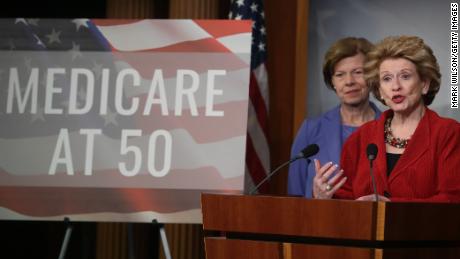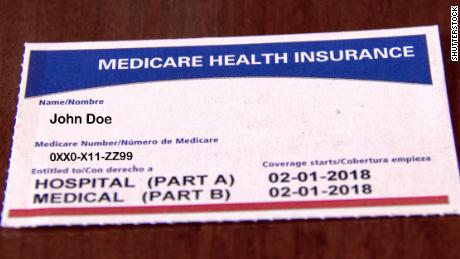(CNN)House progressive Democratic leaders are set to unveil their own sweeping version of Medicare for all Wednesday, looking to put their stamp on a key legislative priority that's pushing the party to the left both in Congress and the 2020 presidential primary.
The bill is sponsored by Reps. Pramila Jayapal of Washington, Debbie Dingell of Michigan and supported by more than 100 others. It's similar both to prior Senate legislation from independent Sen. Bernie Sanders of Vermont and a House version that had been introduced several times by former Rep. John Conyers of Michigan.
The proposal would overhaul the nation's health care system by creating a government-run plan that would insure all Americans. It would provide generous coverage at no cost to patients, but could cut payments to many hospitals and doctors.
"There are some things that should not be provided through the for-profit marketplace," said Jayapal, slamming current system as putting profits ahead of people. "Health care is one of them."
The legislation is chock full of progressive wish list items -- going even further than Sanders' plan by providing robust and costly long-term care services -- but sidesteps the thorniest of issues: How to pay for it.
Its unveiling arrives at a period of heated debate within the Democratic party over how to expand health care to more Americans -- and whether the single-payer system championed by Sanders, Jayapal and other progressive leaders is the best route forward.
Other more moderate Democrats have suggested the plan is too expensive and politically toxic, gravitating instead to bills that would allow Americans to buy into Medicare at age 50 or to purchase Medicaid coverage, which currently insures low-income people of all ages.
While many lawmakers are backing Jayapal's plan, the reception among House leaders remains tepid. The chairs of the rules and budget committees have agreed to hold hearings, but the heads of Ways & Means and Energy & Commerce, whose support is critical for the bill to advance, have yet to commit.
House Budget Committee chairman John Yarmuth, a Kentucky Democrat, said "it's probably unlikely" that this Congress will hold a vote on Medicare for all, despite it becoming a hot button Democratic issue.
"I'm not sure there would be enough agreement in the (Democratic) caucus on a specific proposal," he said. "But I think that's why these discussions are really important. That's why I think our hearing on the budgetary implications of expanded health care (is) really critical."
Asked how leaders view the bill, Jayapal said that Speaker Nancy Pelosi told her they could work together to hold "real discussions" on the issue. Pelosi's office didn't immediately respond to a request for comment.
Jayapal added that she believes hearings will be held in the Ways & Means and Energy & Commerce committees.
As Democrats debate the details among themselves, opponents are lining up to quash any version from becoming reality. Insurers, hospitals, doctors and pharmaceutical lobbyists have created a coalition to tell lawmakers and the public of the dangers of a single-payer system -- which they argue would mean less choice and longer waits for care.
Like Sanders' bill, the House version sponsored by Jayapal would provide a comprehensive coverage, including not only primary and specialty care, hospitalization, mental health, maternity care and prescription drugs, but also vision, hearing and dental care.
It prohibits restrictions related to abortions and reproductive health services, and it would require the federal government to negotiate drug prices. The legislation also calls for undocumented immigrants to be covered.
Premiums, deductibles and co-pays would disappear, and patients could see any doctor or hospital they wish without worrying whether they are in network.
"Let's stop nibbling around the edges," Jayapal said. "People are dying. They can't afford their drugs. Meanwhile, we have these industries that are profiting off of that."
Providers, however, could see changes in their reimbursements, especially since Medicare pays lower rates than commercial insurers. The legislation calls for hospitals to receive quarterly lump sum payments negotiated by regional directors, while doctors would receive fees for their services, which would be set by the Secretary of Health & Human Services.
Private insurance, including the job-based coverage that now insures roughly half of Americans, would not have much of a role. Employers and insurers could only sell supplemental plans for services not covered under Medicare for all, such as elective procedures like cosmetic surgery.
The legislation also sets aside money to provide job training, wage replacement and other assistance to workers who are displaced by the switch to a single payer system, which some experts peg at up to 2 million people.
The House bill differs from Sanders' version in that the transition would take a little more than two years instead of four. Plus, it would provide long-term care services for the elderly and disabled, including covering home health aides, rehabilitation services and nursing home stays.
Jayapal, however, does not detail how she would cover the tab, which would likely run into the trillions of dollars.
Sanders' legislation would raise taxes on all Americans and hike them even more on the rich -- arguing that many people would come out ahead because they'd no longer have to pay premiums or shell out for care.
The House bill would draw on similar financing proposals, including having employers pay premiums into the system, Jayapal said.







